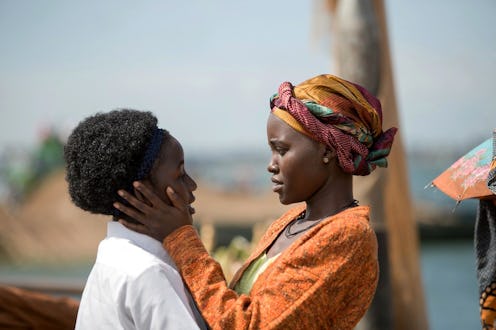Entertainment
'Queen Of Katwe's Writer Is A Male Ally

It's not every day that a major Hollywood studio decides to make a movie about a teenage girl, let alone have the film be directed by a woman and starring a largely black, female cast. So when it was announced that Queen of Katwe, Mira Nair's new film about the real-life chess prodigy Phiona Mutesi, was coming to theaters, many people were thrilled to see one movie making such huge steps being made for the representation of women on-screen. So it might come as a surprise to many, then, to learn that Katwe, a movie all about female empowerment, is written by a man — and screenwriter William Wheeler understands any raised eyebrows his involvement might get.
"Mira thought that maybe I might be the right person to tackle it, which I wasn’t necessarily convinced of initially," Wheeler (The Reluctant Fundamentalist) tells Bustle while discussing the new film over the phone. "I was like, really, me? I live really far, I’ve never been to Uganda, I’m this white dude. Why am I the right guy for this?"
At the beginning, Wheeler debated whether he, a man coming from a world far different than Phiona's or her family's, would be able to "have enough of a sense of empathy to be able to communicate effectively what their story was," he says. But he trusted that Nair had picked him as the film's screenwriter for a reason — and that her vision for the film was for it to tell a universal story, one that'd connect with viewers of all races, genders, and backgrounds.
"It’s not like I would’ve been surprised or bummed out if there’d been a choice to go in a different direction," he says of his hiring. "But I think that part of what this process was, it was really color blind in every way. It was culture blind, too... the commonality of these experiences, the moments in our lives that we’ve had obstacles that feel impossible to overcome, or feeling that our family doesn’t quite understood a new world that we’ve found or a new life that we’ve found for ourselves — those are very common experiences, that we have, and they aren’t necessarily culture specific."
Indeed, Katwe's story of Phiona, a Ugandan teen whose prodigious chess skills lead her to win international championships, has plenty of universal themes, from overcoming challenges to defying tradition. It's an uplifting, emotional tale, a film bound to resonate strongly with anyone who sees it (and bring out at least a few tears). Yet women, especially, will be inspired by Phiona's journey, in which she harnesses her inner strength to find success despite odds certainly not in her favor. Both her impoverished background and gender causes many people to assume she's unskilled and unintelligent; her mother's apprehension about letting her play chess and leave Katwe too often keeps her from the sport; her own inflated ego after winning a major competition nearly ruins her chances of any later victories. Phiona's story may be unique, but her desire to overcome even the biggest of obstacles and prove herself as a force to be reckoned with is one familiar to women everywhere.
Disney hiring a female screenwriter to tell this clearly feminist story may have seemed like a natural choice, but through his powerful script and respect of Nair's vision, Wheeler shows that he understands the importance of the film's message — and acts as a shining example of how male writers can be allies for the women whose stories are told on-screen.
Image: Walt Disney Studios